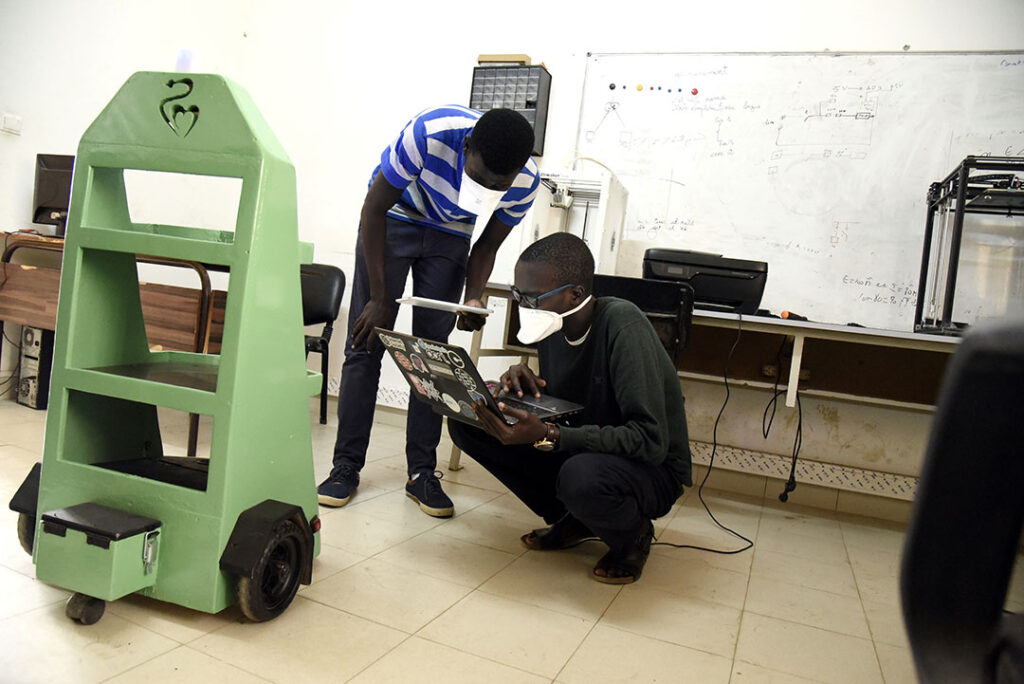ADF STAFF
Ezedin Kamil, an 18-year-old Ethiopian student from rural Welkite, has a mind full of ideas and the skills to turn them into reality.
He has produced about 30 inventions, and just under half of them have been patented by Save Ideas, a nonprofit working in Ethiopia and Nigeria to help creators protect their intellectual property. Kamil has invented an alarm to warn people when they are about to touch their face, a chief way COVID-19 is spread. He also has designed smartphone apps and other technology.
Kamil’s most successful invention to date is a no-touch soap dispenser with an electronic sensor that also has a foot pedal so it can work during power failures. So far, the local university and hospitals have produced 50 of Kamil’s dispensers for public use.
“A majority of Africa’s problems require mostly African solutions or solutions designed with Africans in mind,” Wale Adeosun, CEO of Nigeria-based Wellvis company, an online health information platform, told the World Economic Forum. Adeosun’s company created a COVID-19 Triage Tool. The free online tool helps users self-assess their virus risk category based on symptoms and exposure history.
Using 3D printers, smartphone apps, and even needle and thread, Kamil and other like-minded inventors across the continent have created homegrown solutions to the problems caused by the spread of COVID-19.
- In Morocco, Droneway Maroc uses drones to disinfect public spaces throughout the country.
- In Senegal, students at Dakar’s Ecole Superieure Polytechnique developed “Dr. Car,” a small robot that can measure patients’ blood pressure and temperature remotely.
- In Zimbabwe, Quickfresh connects shoppers online with food vendors as they avoid open-air markets.
In Benin, Sémé-City is a government-funded hub to support innovators and startups.
“People come to Sémé-City seeking potential colleagues, training and backing,” Sémé-City director Claude Borna told AFP. “Young people are often full of ideas but lack the framework and the backup.”
With smartphones widespread across Africa, apps have become key ways for creators to put their ideas into action. In Kenya, increasingly popular digital currency in place of paper money has helped reduce the spread of the virus in markets. Botswana’s B’SAFE app is one of several developed across the continent to trace people exposed to COVID-19. B’SAFE creates individual and business QR codes, or barcodes, to trace COVID-19 exposure and alert other app users. QR codes also are at the heart of South Africa’s Cov-ID app that tracks the movements of users.
Ibrahima Gueye, associate professor at École Polytechnique de Thiès, said the scope of the pandemic has energized and brought focus on the inventive spirit of Africans.
“It was certainly a catalyst, but above all it helped to shed light on this work,” Gueye told ADF. “The dimension of the pandemic has made it arouse interest everywhere, and any useful work in any way to fight against COVID-19 is highlighted.”
In many ways, Africa benefits from having a young population, Gueye said.
“Indeed, the energy and ‘recklessness’ of young people mean that they do not set limits, and above all they do not have certain received ideas or complexes,” Gueye said. “Young people are well connected to the rest of the world via the web. They have access to great free documentation, they are active in maker spaces and other similar places. In addition, they have time for some and want to prove that they are capable.”
In Ethiopia, Kamil is an example of Africa’s inventive youth in action. When he learned Ethiopia had just a few hundred ventilators to treat COVID-19 patients, he set about building his own. He found designs online and developed a design controlled by a cellphone.
“When I heard about the global shortage and the high price of ventilators, I thought about building them myself,” Ezedin told Deutsche Welle. “Ethiopia used to import those machines, but I didn’t think foreign countries would help us at this time.”
The future, Gueye said, depends on African leaders taking advantage of the innovations and creativity of their own populations.
“This boom is one of the turns that should not be missed,” Gueye said. “It must be made to last and increase tenfold. This would allow Africa to finally produce and resolve some of its problems endogenously, but above all generate income and create jobs.”

